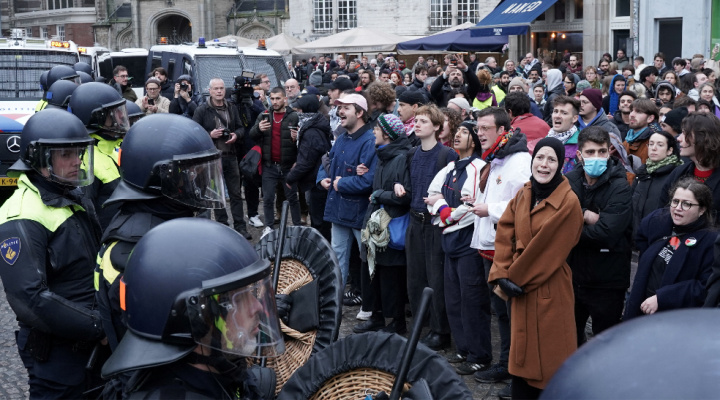Anti-Israel protesters face Dutch police during a banned demonstration in Amsterdam, Netherlands, Nov. 10, 2024. Photo: REUTERS/Esther Verkaik
The Netherlands often presents itself as a beacon of tolerance and progress. But in recent years, that image has started to crack — especially in its universities. These institutions, which should champion open discussion and critical thinking, are now becoming known for something else: hostility toward Jewish and Israeli voices.
Recently, the heads of Dutch universities published a “Statement on Academic Freedom.” It’s full of idealistic talk about openness, free debate, and the importance of diverse opinions. But for many Jewish and Israeli academics, these words ring hollow.
Where was this concern for free expression over the past two years, when Jewish speakers were uninvited, Israeli scholars were boycotted, and students of multiple religions were silenced just for expressing support for Israel?
Where was this defense of dialogue when protests took over campus buildings, tried to intimidate and force out Jews, and declared these buildings and institutions were “Zionist-free”?
And let’s be clear — “Zionist-free” isn’t just about Israel; it’s a chilling phrase that echoes a much darker history.
And this isn’t just about silence. In some cases, universities actively supported or ignored clear discrimination against Jews and anyone who supported Israel’s right to exist.
At Wageningen University, for example, staff openly pledged not to supervise Israeli students. That’s not protest — that’s academic discrimination, pure and simple. The administration said nothing.
At TU Delft, a course described Israel as a colonial project and framed all Israelis as colonizers. Some of the people involved had even supported terror groups like Hamas, or downplayed the Holocaust. This wasn’t fringe — it was university-approved.
At Maastricht University, Jewish speakers were denied platforms due to “security concerns,” while pro-Palestinian speakers with long histories of hate speech were welcomed. The university even gave office space to a group known for antisemitic rhetoric and threats of violence. And Jewish professors needed security just to walk through campus.
So when these same universities now suddenly say they care about academic freedom — after ignoring these issues for years if they involved anyone Jewish or who supported Israel’s right to exist — it’s hard to take them seriously. It feels less like a change of heart, and more like damage control.
The truth is, academic freedom only means something when it’s applied fairly — not just to those with popular opinions, but also to those who face criticism and hostility. That includes Jewish and pro-Israeli voices.
If Dutch academia wants to rebuild trust, it must begin with honesty: admit the past failures, recognize the harm caused, and commit to applying its values consistently. That’s the only way forward.
This isn’t just a policy issue. It’s a moral one.
Sabine Sterk is CEO of Time To Stand Up For Israel.
The post The Netherlands Also Has a Campus Antisemitism Problem first appeared on Algemeiner.com.
Click this link for the original source of this article.
Author: Sabine Sterk
This content is courtesy of, and owned and copyrighted by, https://www.algemeiner.com and its author. This content is made available by use of the public RSS feed offered by the host site and is used for educational purposes only. If you are the author or represent the host site and would like this content removed now and in the future, please contact USSANews.com using the email address in the Contact page found in the website menu.








